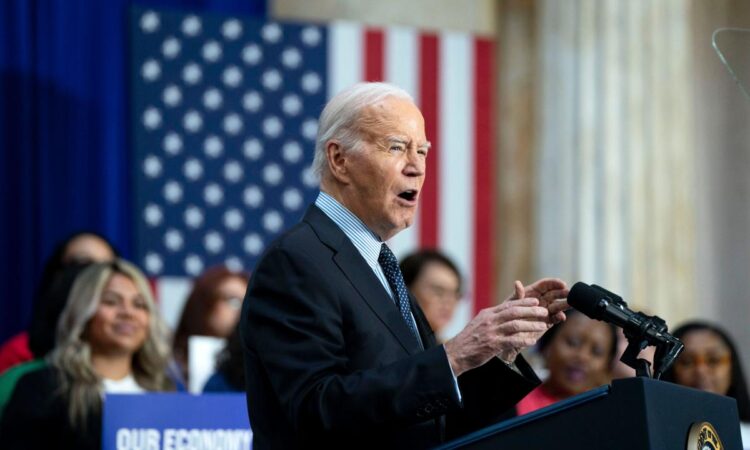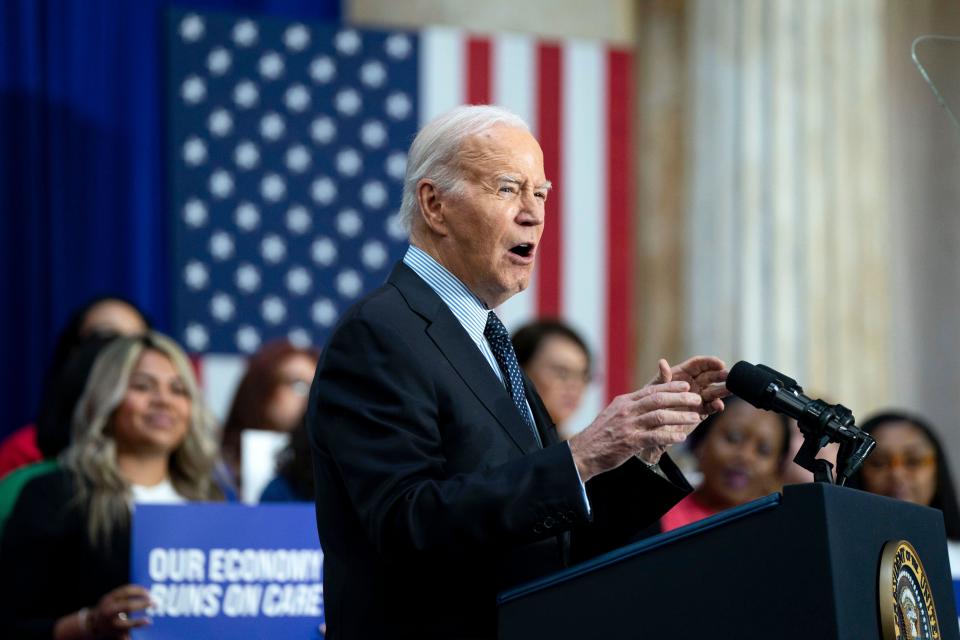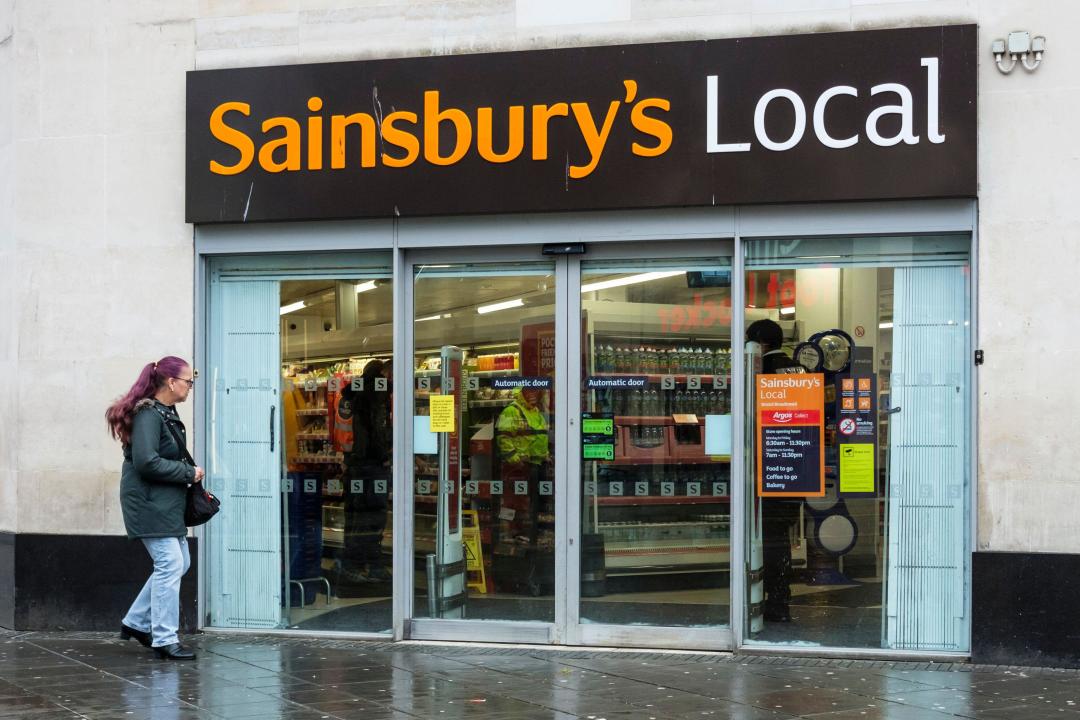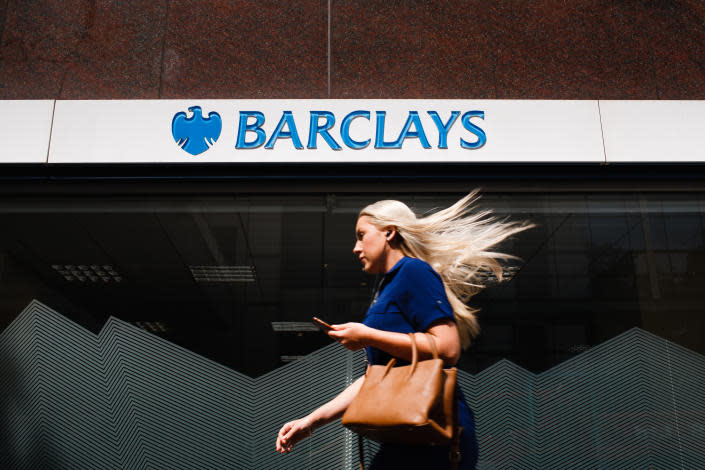FTSE 100 closes high and Wall Street falls as US growth slows


Wall Street stocks slipped into the red on Thursday, while FTSE 100 (^FTSE) outperformed against its European peers, hitting a new intraday high for the third session in a row.
It came as US economic growth slowed sharply, at an annual rate of 1.6% in the first quarter, meaning it only expanded by 0.4% in the three months. This is a slowdown on the fourth quarter of 2023, when real gross domestic product (GDP) increased at 3.4% per year, or by 0.85% in the quarter.
Paul Ashworth, chief North America economist at Capital Economics, said: “Exports ended up increasing by only 0.9%, illustrating the impact of weak global demand, while imports surged by 7.2%. Altogether, net exports subtracted nearly 0.9% points from GDP growth, with inventories generating an additional drag of nearly 0.4 percentage points.”
Along with a barrage of corporate earnings in London, there will be yet more quarterly figures from America’s tech titans on Thursday, with Google, Microsoft and Intel all due to report today.
Ipek Ozkardeskaya, senior analyst at Swissquote Bank, said: “So far, we observe that the high expectations have played tricks on stock valuations and the first set of earnings reactions warn that even strong results from Big Tech may not suffice to send their stock prices higher – if we start seeing growth expectations level out.”
Follow along for live updates throughout the day:
Live22 updates
-
Blog close and recap
Well that’s all from us today, thanks for following along. Be sure to join us again tomorrow for the final blog of the week.
Here’s a quick recap of some of the top headlines from today…
-
BHP proposes takeover of Anglo American
-
US growth slows to 1.6% per year
-
Barclays profits drop 12% amid mortgage squeeze
-
UK advertising spend falls
-
UK retail sales slide as Easter disrupts spending
-
Unilever sales jump
-
Bitcoin price slides amid Grayscale ETF sell-off
-
Turkey leaves interest rates at 50%
Have a good evening!
-
-
Oil price could exceed $100 a barrel if Middle East conflict worsens
The World Bank has said that rising tensions in the Middle East would push the price of oil above $100 (£80) a barrel and reverse the recent downward trend in global inflation.
A recent fall in commodity prices had been levelling off even before the recent missile strikes by Iran and Israel, it said, making interest rate decisions for central banks tougher.
The World Bank’s latest commodity markets report said:
“A moderate conflict-related supply disruption could raise the average Brent price this year to $92 a barrel. A more severe disruption could see oil prices surpass $100 a barrel, raising global inflation in 2024 by nearly one percentage point.”
-
Traders push back Fed rate cut expectations
Money markets are now expecting the Federal Reserve to cut interest rates for the first time by December, having been priced in previously by November.
The core PCE prices index, which is closely watched by the Federal Reserve, showed inflation rose to 3.7% during the first quarter, ahead of analyst expectations of 3.4%.
It comes after separate figures showed the US economy grew less than expected in the first three months of the year at 1.6%.
Ian Lyngen at BMO Capital Markets said:
“Stagflation chatter will surely pick up in the wake of these figures, but we’re less concerned with such an outcome as long as the labour market remains so strong.”
Charles Schwab UK managing director Richard Flynn said:
“Looking ahead, we might expect to see these figures temper the bullish narrative that pushed the market to record highs in the first few months of this year.”
-
Breakdown of US growth data
Paul Ashworth, chief North America economist at Capital Economics, said:
“Exports ended up increasing by only 0.9%, illustrating the impact of weak global demand, while imports surged by 7.2%.
“Altogether, net exports subtracted nearly 0.9% points from GDP growth, with inventories generating an additional drag of nearly 0.4 percentage points.
⚠️Breaking! 🇺🇸US GDP Slows More Than Expected
📉GDP 1.6% (est. 2.5%, prev. 3.4%)
📉Consumption 2.5% (est. 2.8%, prev. 3.3%)
📉Government Spending 1.2% (prev. 4.6%)
📈Investment 3.2% (prev. 0.7%)
📉Exports 0.9% (prev. 5.1%)
📈Imports 7.2% (prev. 2.2%)
📍More Details:… pic.twitter.com/Zwu6J5FchM— MacroMicro (@MacroMicroMe) April 25, 2024
-
US growth slows to 1.6% per year
US economic growth slowed sharply this year, at an annual rate of 1.6% in the first quarter, meaning it only expanded by 0.4% in the three months.
This is a slowdown on the fourth quarter of 2023, when real gross domestic product (GDP) increased at 3.4% per year, or by 0.85% in the quarter.
The Bureau of Economic Analysis said:
“The increase in the first quarter primarily reflected increases in consumer spending and housing investment that were partly offset by a decrease in inventory investment. Imports, which are a subtraction in the calculation of GDP, increased.”
BREAKING: US Q1 2024 GDP comes in at 1.6%, BELOW expectations of 2.5%.
If 1.6% is the final reading, it will end 6 STRAIGHT quarters of 2%+ growth.
However, we still have not had 2 consecutive quarters with declining GDP since Q2 2022.
Is the economy beginning to weaken?
— The Kobeissi Letter (@KobeissiLetter) April 25, 2024
-
Microsoft set to report March quarter earnings after the bell


Microsoft (MSFT) is due to report March quarter earnings after the close of US trading this Thursday, with its stake in AI and cloud computing market of particular interest to investors.
In its prior quarter, Microsoft announced that its AI capabilities contributed 6 percentage points of growth to the company’s Azure revenue, up from 3% in the previous period, and analysts are looking for more.
Consensus expectations among analysts tracked by FactSet are for revenue of $60.9bn (£46.33bn), with a profit of $2.82 a share.
In the same period last year, Microsoft reported EPS of $2.45 on revenue of $52.86bn.
In terms of business segments, Wall Street anticipates Microsoft will report productivity and business processes revenue of $19.54bn, intelligent cloud revenue of $26.25bn, and more personal computing revenue of $15.07bn.
-
Wall Street set to open lower
Wall Street is set to open lower with traders keeping their eyes on economic data on Thursday, with the first reading of US gross domestic product for the first quarter.
Consensus is that the economy expanded at a quarterly annualised pace of 2.5%, down on 3.4% at the end of 2023.
Pierre Veyret, technical analyst at ActivTrades, said:
“Indeed, US figures falling short of expectations could help lift market sentiment toward riskier assets, with the prospect of a less hawkish stance from the Fed.”
“With so many market drivers, we expect market volatility to remain high for the end of the week as traders will likely keep recalibrating their portfolio’s exposure depending on what the macro front provides them.”
-
UK retail sales slide as Easter disrupts spending
UK retailers suffered their worst April sales since the pandemic four years ago, according to new data.
The CBI’s distributive trades survey, which tracks whether retailers reported higher or lower sales volumes, has fallen to -44 from 2 in March.
The decline is likely to be related to the early timing of Easter this year, the CBI said.
Retail sales volumes fell sharply in the year to April, likely effected by the earlier timing of Easter this year. Retailers expect sales to fall again, at a more moderate pace, next month. #DTS pic.twitter.com/hlETafulTI
— CBI Economics (@CBI_Economics) April 25, 2024
-
Turkey leaves interest rates at 50%
Turkey’s central bank has held its key interest rate on hold as soaring inflation remains a headache for president Recep Tayyip Erdogan’s government.
The central bank’s monetary policy committee decided to keep the policy rate at 50%, saying it was “closely” monitoring inflation.
Economist Liam Peach of Capital Economics said he does not expect Turkey to cut rates until next year, with inflation forecast to peak at more than 70% in May.
-
Trainline shares fall


The Trainline Website on a Smartphone, UK (Aidan Stock) Online ticketing platform Trainline shares were lower on the same day that the Labour Party pledged to renationalise Britain’s railways if it is elected. Labour said it would take five years to conclude the plan.
Karl Burns, analyst at Canaccord, said in a note last month that “crucially, Labour has no plans to revive plans for a central ticketing platform, with Labour seeing the third-party retail market as key in their vision”.
-
AstraZeneca in good place as 2024 pipeline shapes up well
Sheena Berry, healthcare analyst at Quilter Cheviot, said:
“AstraZeneca is in a really good place just now and as such allows it to remain focused on reinvesting in the business. It has a strong pipeline and solid potential for positive updates.
“The group remains focused on investing in new platforms and technologies such as antibody drug conjugates and cell therapies. The Q1 results demonstrate the group’s ability to continue delivering strong growth while also looking to spend and innovate.
“We will get a better idea of the exact detail of its pipeline and longer-term guidance at its investor day in May, but for investors the key ones to look out for include a Phase III readout with cancer drug Enhertu in a form of breast cancer and potential US approval in second line lung cancer with Dato-Dxd. Should these come through for AstraZeneca, 2024 will shape up to be a successful year.”
-
AstraZeneca beats first quarter forecasts
AstraZeneca (AZN.L) was in demand on Thursday after the drugmaker said first-quarter revenues were up 18% on the back of strong sales of its cancer drugs.
Revenues came in at $12.7bn, beating the $11.9bn guidance, lifting shares by 5%.
Oncology, the Anglo-Swedish firm’s top business, delivered a 26% jump in first-quarter sales to $5.12bn.
Earnings per share excluding some items rose 7% to $2.06 in the first quarter. Analysts surveyed by Bloomberg expected $1.89 on average.
Notable developments in the quarter included positive trial results for Imfinzi and Tagrisso in lung cancer, and several US and EU approvals for other drugs.
AstraZeneca reiterated its full-year guidance of low double-digit to low teens percentage growth in both total revenues and EPS.
The group said the total dividend for the year will increase by $0.20 per share to $3.10.
-
Will Bitcoin hit new all-time highs again in 2024?
Bitcoin may hit fresh all-time highs in the coming months, an analyst as predicted, despite having recently sunk in price (as seen in the previous post).
The bullish comments from Nigel Green of deVere Group come after the largest cryptocurrency recently experienced a sell-off following the news of escalating military and diplomatic tensions between Israel and Iran.
He said:
“We believe that the negative impact of recent events has now already been factored into Bitcoin’s price, paving the way for positive structural drivers to reassert dominance.
“Chief among these factors is the supply shock resulting from Bitcoin’s recent halving event, a mechanism embedded in the crypto’s protocol that reduces the rate at which new Bitcoins are generated.
“With the halving cutting the supply of new Bitcoin issuance to 3.125 bitcoins per block, the scarcity of the digital asset is set to drive up its value,”
He foresees Bitcoin surpassing its previous record high of $73,800, achieved on 14 March. Bitcoin has gained more than 50% this year.
-
Bitcoin price slides amid Grayscale ETF sell-off


Bitcoin fell 4% over the past 24 hours, dipping below $65,000 (£51,919) after outflows from Grayscale’s exchange-traded fund GBTC hit $130m on Wednesday, and BlackRock paused a 71-day inflow streak into its fund.
According to Coingecko data, bitcoin (BTC-USD) is currently changing hands for $64,288.
Also, BlackRock’s (BLK) iShares Bitcoin Trust IBIT fund failed to attract any investor funds for the first time since it started on 11 January, ending a 71 consecutive day streak of inflows. Following IBIT’s example, seven out of the other 10 spot bitcoin ETFs also reported zero daily inflows.
According to the data from Farside Investors, the only ETFs that recorded inflows on Wednesday were Fidelity’s FBTC and the ARK 21Shares Bitcoin ETF (ARKB), with inflows of $5.6m and $4.2m, respectively.
-
Unilever sales jump
And sticking with corporate news… Unilever (ULVR.L), the maker of Ben & Jerry’s ice cream and Marmite, has announced its first quarter results.
Here are the key takeaways:
-
Underlying sales growth of 4.4% with prices and volumes both increasing by 2.2%.
-
Power Brands grew by 6.1%.
-
Full-year outlook unchanged
-
It is guiding for underlying sales growth of 3% to 5% in FY24, with modest operating margin improvement.
-
It comes as it is looking for buyers for its ice cream business
Charlie Huggins, manager of the quality shares portfolio at Wealth Club, said:
“Unilever should be performing better. Hein Schumacher’s ‘Action Plan’ is designed to reinvigorate performance through more impactful innovation, productivity savings and an improved culture, with an enhanced focus on the top 30 Power Brands.
“While it is early days, there are already promising signs. The Power Brands are out-performing the rest of the portfolio, growing volumes by 3.8% in the first quarter. A greater focus on these seems eminently sensible. Meanwhile, the recently announced separation of the ice cream business shows Unilever’s CEO is willing to take bold steps to turn the company around, which is what Unilever desperately needs.
“Ice cream is a lower margin business and has struggled recently, losing share to competitors. Separating out the ice cream business will simplify the group and free up resources to invest behind the biggest brands. It is all part of the new CEO’s master plan of doing “fewer things, better and with greater impact”.
-
-
Sainsbury’s profits to beat £1bn as it wins customers


Entrance of Sainsburys local supermarket in Broadmead shopping quarter Bristol UK (Mr Standfast) Sainsbury’s (SBRY.L) expects to deliver “strong” profit growth in the year ahead after posting a rise in food sales, and reining in prices to help win customers from its rivals.
The UK’s second biggest supermarket reported a better-than-expected 1.6% rise in underlying pre-tax profits to £701m for the year to 2 March.
Total grocery sales were up 7.3% in the fourth quarter and 9.4% over the year, as it saw sales by volume pick up as inflation eased back.
This helped offset a tough market for general merchandise, with fourth-quarter Argos sales down 6.6%, and clothing also tumbling 11.7%.
The group said it was set for earnings to rise in 2024-25, pencilling in underlying retail operating profits of between £1.01bn and £1.06bn – up between 5% and 10%.
It said:
“We are confident of delivering strong profit growth in the year ahead. We expect to continue to grow grocery volumes ahead of the market, driving profit leverage.”
-
FTSE 100 hits 8100 points for first time
London stocks are rallying this morning and the Footsie has hit a new intraday record high.
The index touched of 8102.14 points this morning for the first time.
-
UK advertising spend falls
UK advertising spend rose by 6.1% to £36.6bn last year — a contraction of 1.2% after accounting for high inflation, a new report has shown.
According to the latest annual Advertising Association/WARC Expenditure analysis, TV advertising spend fell almost 9% dropping from £5.3bn in 2022 to £4.9bn.
Advertising spend in magazine brands was also hit badly falling 9% from £553.8m in 2022 to £503.3m last year and in regional media brands it fell almost 10% from £505.2m in 2022 to £454.2m last year.
Advertising is seen as a bellwether of the economic climate and in the past year the sector has been buffeted as corporate clients cut back. This has hit broadcasters such as ITV and Channel 4.
Looking ahead to this year, the report forecast that spend will rise 5.8% to reach £38.8bn as advertisers will be investing more in brand-building campaigns.
James McDonald, director of data, intelligence & forecasting at WARC, said:
“Our latest survey of media owners confirms 2023 as a challenging year for most, with few properties recording gains and spend instead further consolidating within search and online display formats– particularly social media.
“Our forecasts assume that the UK’s economy will begin to break from the pattern of stagnation that has come to define recent quarters. Easing inflation over the coming 18 months should encourage more favourable trading conditions within the advertising sector, facilitating growth across a broader range of channels in turn.”
-
Barclays profits drop 12% amid mortgage squeeze


Barclays (BARC.L) has reported lower profits for the start of the year, as mortgage lending and deposits dipped and its investment bank underperformed.
Profit after tax dropped to £1.6bn in the first three months of 2024, compared with £1.8bn in the same period one year earlier, Barclays said in a results statement.
Pre-tax profits were down 12% to £2.28bn in the first three months of the year from £2.6bn a year earlier. Despite the drop, this is still slightly better than its own consensus forecast of £2.195bn.
Group income fell 4% to £7bn, while net interest margin – the difference between what the bank charges for loans and savings – fell to 3.09% from 3.18%.
Meanwhile, its net interest margin (NIM), excluding the investment bank and head office, fell to 4.12% in the first quarter from 4.16% in the same period last year.
UK operations were hit by “subdued mortgage lending amid lower market demand”, while customer deposits declined on increased competition in savings accounts in the UK, according to Barclays.
It saw customer deposits dip by 2% driven by lower customer account balances, which the bank said reflected broader consumer trends.
-
BHP proposes takeover of Anglo American
Miner Anglo American (AAL.L) has climbed to the top of the FTSE 100 this morning with shares boosted after a buyout offer from BHP Group (BHP.L).
The stock climbed to a nine-month high after BHP said it made an offer to buy the London-listed miner, valuing its share capital at £31.1bn.
The deal would create the world’s biggest copper miner with around 10% of global output.
The proposal is conditional on Anglo first splitting off its South African platinum and iron ore units, suggesting BHP is primarily interested in Anglo’s copper resources.
Susannah Streeter, head of money and markets at Hargreaves Lansdown, said:
“The buyout offer from BHP, the world’s largest publicly listed miner, for Anglo American, won’t just shake up the mining industry, but will send a fresh chill through the City of London.
“There are concerns that if the deal goes through it could be the tip of the iceberg and more giants could leave the exchange.
“It comes hot on the heels of speculation that Shell might up sticks and leave for New York, rumours that Ocado may be considering leaving for the Big Apple, and follows the crushing disappointment of home-grown chip designer Arm choosing the Nasdaq over the FTSE 100.”
Watch: What is a recession and how do we spot one?
Download the Yahoo Finance app, available for Apple and Android.






